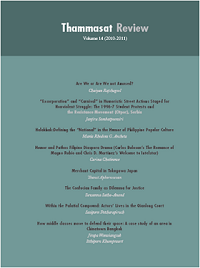Merchant Capital in Tokugawa Japan
Abstract
This article attempts to answer why industrial capital had not developed in Japan to the point of providing the basis for the rise of capitalism like it happened in Europe. The key finding is the role of merchant capital in the Tokugawa period. The important condition in this historic development is the system of production for the markets must replace the production for use. However, merchant capital is only circulating capital in which it has as yet by no means become the foundation of production. Moreover, the political roles of the merchant class are still much less significant than their economic roles. The merchant class as a whole does not cause the total transformation of the Tokugawa society. The rural merchants were still bound within a feudal authority structure which limited their activities to a certain extent. Thus, merchant capital, in its highest stage of the Tokugawa period, could not become industrial capital. The most it could perform was to provide a head-start and ground for the eventual emergence of a fully developed capitalist system.Downloads
How to Cite
Aphornsuvan, T. (2015). Merchant Capital in Tokugawa Japan. Thammasat Review, 14(1), 77–98. retrieved from https://sc01.tci-thaijo.org/index.php/tureview/article/view/40803
Issue
Section
Articles
License
The opinions and ideas expressed in all submissions published in Thammasat Review are solely that of the author(s) and do not necessarily reflect that of the editors or the editorial board.
The copyright of all articles including all written content and illustrations belong to Thammasat Review. Any individuals or organisation wishing to publish, reproduce and distribute a particular manuscript must seek permission from the journal first.








